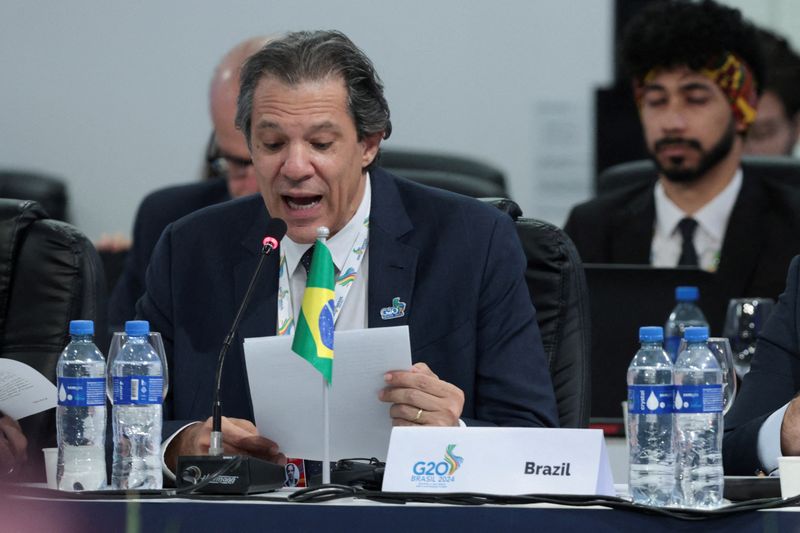By Marcela Ayres and Andrea Shalal
WASHINGTON (Reuters) -Brazil’s proposal to tax the super-rich gained momentum on Wednesday, with France’s finance minister and the head of the International Monetary Fund backing a coordinated push to generate new revenue and build a better common future.
Brazilian Finance Minister Fernando Haddad said Brazil, current president of the Group of Twenty (G20), was aiming to build international consensus on the taxation of wealth this year, and would push for a joint declaration at a meeting of G20 finance ministers and central bankers in July.
“The G20 declaration that we are going to propose aims to politically back these initiatives,” he told an event during the spring meetings of the IMF and World Bank, underscoring the importance of winning support from the biggest economies.
His French counterpart Bruno le Maire, who had already expressed support for the Brazilian proposal, told the event that moving to tax the rich was the logical next step for a series of global taxation reforms launched in 2017, including agreement on a global corporate minimum tax. He said the G20 should aim to reach an agreement on taxing the rich by 2027.
Le Maire said any proposal should be based on the best practices of the Organization for Economic Cooperation and Development to ensure trust in the evolving system.
IMF chief Kristalina Georgieva said closing tax loopholes and ensuring that wealthy people paid their fair share would mobilize funds urgently needed for sustainable and inclusive growth.
She said IMF research showed that ending tax avoidance by corporations could generate an additional $200 billion a year in revenue, while implementation of a global corporate minimum tax would result in an additional $150 billion. The IMF also estimated that setting a minimum floor for carbon pricing could boost revenue by $1.4 trillion a year, she said.
“What I would say is very simple: When policymakers have the will, there is a way, and we have put out what the way is,” she said.
Haddad had earlier told Reuters that Wednesday’s G20 working dinner would discuss how funds raised through this new avenue of taxation could address combating hunger and how to transition to a greener economy.
Haddad noted that Nobel Prize-winning economist Esther Duflo would participate in the dinner, along with Gabriel Zucman, director of the European Tax Observatory, whom Brazil has asked to compile a report on the matter in time for the next G20 finance track meeting in July.
“If we can achieve consensus on this by the end of the year, it’s such an extraordinary thing … it’s historic,” he said.

Zucman has suggested that one possibility would be to ensure that very high-net-worth individuals pay at least the equivalent of 2% of their wealth in income tax each year, which he estimated could generate $250 billion per year – half of the annual revenue projected as necessary for developing countries to address climate change challenges.
Susana Ruiz Rodriguez, regional tax coordinator for Oxfam, said it was the first time that taxing the super-rich was being discussed at the IMF-World meetings, although 2% was a very modest target. Oxfam estimates that an annual wealth tax of more than 8% across all countries would have been needed to keep billionaires’ wealth constant over the last two decades.
